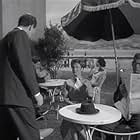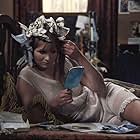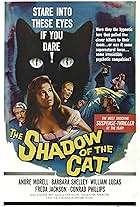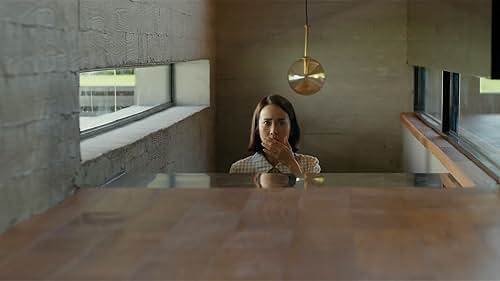IMDb-BEWERTUNG
6,7/10
2789
IHRE BEWERTUNG
Füge eine Handlung in deiner Sprache hinzuA young woman is plagued by nightmares of her asylum-patient mother. Upon returning to her family home, the nightmares become real when she sees a strange woman pacing the halls.A young woman is plagued by nightmares of her asylum-patient mother. Upon returning to her family home, the nightmares become real when she sees a strange woman pacing the halls.A young woman is plagued by nightmares of her asylum-patient mother. Upon returning to her family home, the nightmares become real when she sees a strange woman pacing the halls.
- Auszeichnungen
- 1 Nominierung insgesamt
Isla Cameron
- Mother
- (Nicht genannt)
Frank Forsyth
- Waiter
- (Nicht genannt)
Julie Samuel
- Anne--Maid
- (Nicht genannt)
Hedger Wallace
- Sir James Dudley
- (Nicht genannt)
Empfohlene Bewertungen
Jimmy Sangster's screenplay for "Nightmare" is an excellent contemporary (early 1960s) thriller with Gothic touches. However, the script falters about halfway through when the young heroine Janet, who has been driven almost out of her mind by a series of terrifying events, is removed from the action of the story.
Instead of centering the action of the second half on characters sympathetic to the heroine who might take up her cause, identify the conspirators and bring them to justice - as happens in, for example, "Psycho" - the script reveals to the audience who the conspirators are, and then, until the final scene, makes them the center of the action.
It is asking a lot of an audience to identify with those whose machinations have brought about the committal of a sympathetic heroine, and this may well explain why the second half of "Nightmare" is less gripping than the first - especially as the plot of the second half is a variation on what has gone before, this time with an unsympathetic character experiencing terrifying events. This part of the screenplay also stretches credibility, since it seems unlikely that an antagonist with an alert and cunning mind would not detect a plot which is dividing him from his female accomplice.
The real strength of "Nightmare", however, is in director Freddie Francis' visual flair. A former cameraman/director of photography, using black and white 'scope and obviously influenced by his work on Jack Clayton's "The Innocents", he succeeds in creating a real sense of fear and isolation around his vulnerable heroine.
He achieves this by using the expanse of the 'scope frame, often surrounding Janet with shadows or, in daylight, setting her in a frame devoid of anything or anybody reassuring. For example: when Janet travels home from school, the railway station is almost deserted; we do not see the departing train from which she has presumably just alighted. There are no other cars on the road as she is driven home. As they pass the asylum she dreads, there are no signs of human activity within the grounds. Once back home she is dwarfed by the mansion "High Towers" she has become heir to, and her isolation is compounded by her home being located in remote snow-covered countryside.
Janet's isolation is social as well as physical; ostracized at boarding school in the early scenes, and clinging to a grotesque doll and a small transistor radio, she is never seen with anyone her own age (mid-teens). Her only friend at the school is a sympathetic teacher. At "High Towers" the guardian she dotes on, Henry Baxter, is at least twice her age - as are her other household companions.
In addition to traditional Gothic trappings (heroines wandering dark corridors in flowing night-dresses, candlelight illumination, door handles seen turning slowly and ghostly nocturnal figures) Freddie Francis endows several everyday objects with fearful connotations - Janet's doll, her transistor radio that forever blares out fast jazz, and above all, a birthday cake with lighted candles. The latter becomes a powerful image of dread, since it was on Janet's eleventh birthday the horrific event occurred that started the cycle of nightmares and fear of inherited insanity.
"Nightmare" has a particularly bleak atmosphere: most of the action is set during a harsh winter, the dialogue has virtually no humor and the ending - which should give the audience a sense of satisfaction - is grimly downbeat. This is probably because in achieving justice for Janet, her sympathizers have virtually duplicated the methods of the conspirators and brought about a similar result - a gruesome death and a woman on the edge of madness.
Highly recommended viewing.
Instead of centering the action of the second half on characters sympathetic to the heroine who might take up her cause, identify the conspirators and bring them to justice - as happens in, for example, "Psycho" - the script reveals to the audience who the conspirators are, and then, until the final scene, makes them the center of the action.
It is asking a lot of an audience to identify with those whose machinations have brought about the committal of a sympathetic heroine, and this may well explain why the second half of "Nightmare" is less gripping than the first - especially as the plot of the second half is a variation on what has gone before, this time with an unsympathetic character experiencing terrifying events. This part of the screenplay also stretches credibility, since it seems unlikely that an antagonist with an alert and cunning mind would not detect a plot which is dividing him from his female accomplice.
The real strength of "Nightmare", however, is in director Freddie Francis' visual flair. A former cameraman/director of photography, using black and white 'scope and obviously influenced by his work on Jack Clayton's "The Innocents", he succeeds in creating a real sense of fear and isolation around his vulnerable heroine.
He achieves this by using the expanse of the 'scope frame, often surrounding Janet with shadows or, in daylight, setting her in a frame devoid of anything or anybody reassuring. For example: when Janet travels home from school, the railway station is almost deserted; we do not see the departing train from which she has presumably just alighted. There are no other cars on the road as she is driven home. As they pass the asylum she dreads, there are no signs of human activity within the grounds. Once back home she is dwarfed by the mansion "High Towers" she has become heir to, and her isolation is compounded by her home being located in remote snow-covered countryside.
Janet's isolation is social as well as physical; ostracized at boarding school in the early scenes, and clinging to a grotesque doll and a small transistor radio, she is never seen with anyone her own age (mid-teens). Her only friend at the school is a sympathetic teacher. At "High Towers" the guardian she dotes on, Henry Baxter, is at least twice her age - as are her other household companions.
In addition to traditional Gothic trappings (heroines wandering dark corridors in flowing night-dresses, candlelight illumination, door handles seen turning slowly and ghostly nocturnal figures) Freddie Francis endows several everyday objects with fearful connotations - Janet's doll, her transistor radio that forever blares out fast jazz, and above all, a birthday cake with lighted candles. The latter becomes a powerful image of dread, since it was on Janet's eleventh birthday the horrific event occurred that started the cycle of nightmares and fear of inherited insanity.
"Nightmare" has a particularly bleak atmosphere: most of the action is set during a harsh winter, the dialogue has virtually no humor and the ending - which should give the audience a sense of satisfaction - is grimly downbeat. This is probably because in achieving justice for Janet, her sympathizers have virtually duplicated the methods of the conspirators and brought about a similar result - a gruesome death and a woman on the edge of madness.
Highly recommended viewing.
Freddie Francis' Nightmare is one of those lesser-known movies from Hammer Films which usually finds itself lumped together in box sets dominated by their more popular Dracula, Frankenstein and The Mummy series. It's obscurity is slightly unfair, as this black-and-white psychological horror-come-slasher unravels itself cleverly and with a healthy dose of style. Written by Hammer regular Jimmy Sangster, Nightmare conjures up a fair share of creepiness despite its age, and often feels somewhat Hitchcockian in its execution.
Janet (Jennie Linden) is a young girl attending boarding school. At night, she is plagued by nightmares of when she witnessed the stabbing of her father at the hands of her deranged mother. As her mental state worsens, she is sent back home to her guardian Henry Baxter (David Knight) and assigned a nurse Grace Maddox (Moira Redmond). Soon after arriving, Janet starts to have visions of a woman she has never seen before with a huge scar on her cheek. Essentially a movie broken into two parts, the second act cannot be summarised without giving away a spoiler.
The visuals are rather bland - Hammer tended to churn out movies quickly and cheaply to serve as a starter for the main event in cinemas - but the black-and-white photography gives the film a Gothic, and almost noirish, sense of style. While Knight is enjoyably smug, the rest of the cast fail to make any real impression, with the pre- Women in Love (1969) Linden extremely lucky to find herself cast after a number of preferable choices, including Julie Christie who chose to make Billy Liar instead, were unavailable. But the film's flaws are to be expected - it is a quickie B-movie after all - and it makes the most of its limitations. The plot's mystery is engrossing and the pacing is odd yet intriguing, and I would recommend Nightmare to any fan of British horror.
Janet (Jennie Linden) is a young girl attending boarding school. At night, she is plagued by nightmares of when she witnessed the stabbing of her father at the hands of her deranged mother. As her mental state worsens, she is sent back home to her guardian Henry Baxter (David Knight) and assigned a nurse Grace Maddox (Moira Redmond). Soon after arriving, Janet starts to have visions of a woman she has never seen before with a huge scar on her cheek. Essentially a movie broken into two parts, the second act cannot be summarised without giving away a spoiler.
The visuals are rather bland - Hammer tended to churn out movies quickly and cheaply to serve as a starter for the main event in cinemas - but the black-and-white photography gives the film a Gothic, and almost noirish, sense of style. While Knight is enjoyably smug, the rest of the cast fail to make any real impression, with the pre- Women in Love (1969) Linden extremely lucky to find herself cast after a number of preferable choices, including Julie Christie who chose to make Billy Liar instead, were unavailable. But the film's flaws are to be expected - it is a quickie B-movie after all - and it makes the most of its limitations. The plot's mystery is engrossing and the pacing is odd yet intriguing, and I would recommend Nightmare to any fan of British horror.
This is a Hammer film- a studio which is most popular for the re-imagined Frankenstein, Dracula and Mummy movies. But, as far as I know, this is a completely original plot line. The first half is truly creepy, the second half isn't quite as good, but it's still worth a watch.
Mysterious puzzle of who or what is behind a young girl, having just returned from a boarding school in the English countryside, becoming increasingly paranoid and psychotic. The girl witnessed her mother killing her father years ago and has nightmares of the event. She believes that she has the same mania and starts seeing her mother, other apparitions, and various things connected with the event that happened on her birthday so long ago. She is heir to the house, but her uncle manages her estate. A nurse is supplied for her and the home is run by an elderly couple of servants that have been with the family for a long time. What starts out as something you keep thinking you have seen before - swiftly and adroitly changes direction and becomes something I had never seen before. This is above all a well-crafted film made with creating suspense and maintaining suspense as its primary objectives. Director Freddie Francis, the Hammer stalwart, directs with his usual keen, meticulous detail for the lens. He paces the film very nicely, and he is aided by very good performances from all concerned. The real credit for the film's success though must go to veteran Hammer writer Jimmy Sangster. Above all this is a script-driven vehicle. Certainly one of the lesser known Hammer horror films but definitely one of the better psycho films I have seen.
Young Janet (Jennie Linden) saw her insane mother stab her father to death when she was a little girl. Years later she's still traumatized by it and is afraid she'll become insane like her mother. Her guardian Henry (David Knight) and nurse Grace (Moira Redmond) try to help her but she starts going mad...
This turns out to be nothing more than a reworking of the French film "Diabolique"--but it's pretty good. I have to admit I was actually surprised by one or two events that I should have seen coming. The film is shot in moody black & white (and Hammerscope) which helps immensely. Also there are good performances--especially by Knight and Redmond. This was a strange movie for Hammer--it wasn't shot in color and had no monsters. Still it works. Recommended. I give it a 7.
This turns out to be nothing more than a reworking of the French film "Diabolique"--but it's pretty good. I have to admit I was actually surprised by one or two events that I should have seen coming. The film is shot in moody black & white (and Hammerscope) which helps immensely. Also there are good performances--especially by Knight and Redmond. This was a strange movie for Hammer--it wasn't shot in color and had no monsters. Still it works. Recommended. I give it a 7.
Discover the nominees, explore red carpet fashion, and cast your ballot!
Wusstest du schon
- WissenswertesThe BFI has the only 35mm print in the UK.
- VerbindungenFeatured in Deadly Earnest's Nightmare Theatre: Nightmare (1978)
Top-Auswahl
Melde dich zum Bewerten an und greife auf die Watchlist für personalisierte Empfehlungen zu.
- How long is Nightmare?Powered by Alexa
Details
- Laufzeit
- 1 Std. 22 Min.(82 min)
- Farbe
- Seitenverhältnis
- 2.35 : 1
Zu dieser Seite beitragen
Bearbeitung vorschlagen oder fehlenden Inhalt hinzufügen



































